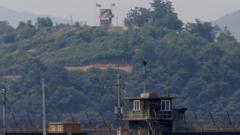After spending decades in South Korea against his will, former North Korean POW Ahn Hak-sop, 95, attempts to journey home to die, only to be turned away due to bureaucratic obstacles. His story reflects the complexities of identity, history, and the enduring impact of the Korean War.
A Korean POW's Final Wish: A Journey to the North for Rest

A Korean POW's Final Wish: A Journey to the North for Rest
95-year-old Ahn Hak-sop longs to return to North Korea, but government hurdles prevent his last wish to be buried in his homeland.
After decades away from his homeland, Ahn Hak-sop, a 95-year-old former North Korean prisoner of war, recently attempted what he called his "final journey" back to North Korea. This poignant event unfolded at Imjingang Station near the border, where a crowd of supporters gathered, reflecting the complex emotions surrounding Korea's divided past.
Ahn dreamed of being laid to rest on the land he refers to as "truly independent," a vision fervently influenced by his experiences beginning from his youth during Japan's colonial rule over Korea. Captured by South Korean forces in 1953 while serving in the North Korean People’s Army, Ahn spent a staggering 42 years in captivity before receiving a pardon. Since then, he has been mired in the complexities of identity and belonging, often feeling out of place in South Korea.
His journey was complex and heartbreaking; weakened by illness, Ahn could not walk the final stretch from the station to the Unification Bridge, which serves as one of the few connections to the North. Instead, flanked by supportive aides, he walked a short distance, donning the North Korean flag — a powerful symbol rarely seen in the South.
Ahn's beliefs are stark; he’s maintained that the Korean peninsula's reunification is thwarted by "imperialist America" and a South Korean government that aligns too closely with it. His experiences during the war and in captivity instilled in him a steadfast notion that returning to the North would mean reclaiming his agency, away from perceived Western influences.
Throughout the years, Ahn has remained a vocal critic of U.S. military policies in the region, asserting that America's role has not liberated the North but merely transformed one form of colonial rule into another. This he believes has denied his people true freedom.
Despite changes in both Koreas since Ahn's imprisonment, such as advancements in South Korea's status as a democracy, his perspective remains unyielded. He continues to advocate against Western influence in Korea, firmly believing in the superiority of North Korean sovereignty.
As time ticks forward, Ahn's wishes reflect a broader narrative of struggle, identity, and the enduring hope for reunification amid a divided history. His recent attempts to return to the North serve as a poignant reminder of the deep wounds inflicted by decades of conflict and the yearning for closure that many Koreans still experience.
















